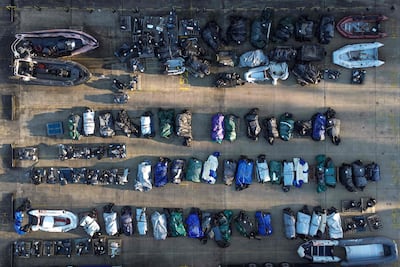“There’s just one question on voting day,” Marion Marechal, the youngest member of a far-right French political dynasty, asserted in a recent campaign speech. “Do you want an Islamised Europe or a European Europe?”
Anti-migrant rhetoric is reaching a fever pitch across Europe as the 27-country bloc prepares to choose a new parliament next week. And thanks to a surge in new arrivals, voters have been pricking up their ears. At the time of the last vote, in 2019, the EU annually processed about half a million asylum applications.
That total has since more than doubled and is now nearing the record highs of 2016, as are illegal crossings detected by border agency Frontex. Last month the EU approved a new migration plan, to start in 2026, that will track new arrivals, set up detention centres and accelerate vetting and possible deportation. Critics argue that it will create a troubling system of surveillance and deny migrants the right to asylum.
Europe has also made several deals that echo the $6 billion EU-Turkey migration plan, despite EU auditors being unable to determine how Ankara spent most of those funds. The UK made a deal with Rwanda to receive rejected asylum seekers, though the scheme may never get off the ground with elections looming in July. Italy has begun setting up migrant holding centres across the Adriatic in Albania.
The EU has committed to pay Tunisia, Morocco, Lebanon, Egypt, Libya and Mauritania $8 billion to boost economic growth and stem migration. An investigation led by The Washington Post reported last week that Europe has been financing North African operations to detain would-be migrants and forcibly move them to remote desert areas as a deterrent. And 15 European countries recently urged the EU to send more asylum seekers to third countries, citing the Italy-Albania deal as a model.
Perhaps because studies have found that such deterrence schemes tend to fail, voters remain unsatisfied. In a May survey, more than seven out of 10 Europeans said their country takes in too many immigrants and 85 per cent urged the EU to do more to combat it. This aligns with the views of the well-dressed young revellers captured in a viral video last week smiling and dancing as they chant, “Germany for Germans! Foreigners out!” (Each EU state elects its MEPs, who then form bloc-wide alliances to boost their legislative influence.)

Europe’s fear-mongers – led by Ms Marechal’s Reconquest party, her husband Vincenzo Sofo’s Brothers of Italy, her aunt Marine Le Pen’s National Rally, Geert Wilders’ Freedom Party, Alternative for Germany (AfD), the Iberian Peninsula’s Vox and Chega and the governing parties in Poland and Hungary – have made immigration the defining issue, turning legitimate voter concerns into a foreign bogeyman coming to snatch their jobs, security and even their identity.
Speakers at a far-right rally in Hungary argued that the Great Replacement is a looming reality. The AfD reportedly backed a secret plan to expel millions of migrants and is thought to be behind billboards across Saxony that portray the governing CDU calling for “more Caliphate”. British MP Suella Braverman, formerly home secretary, argued in a UK newspaper that Islamists were gaining control of Britain.
Turkish President Recep Tayyip Erdogan has repeatedly denounced this assault and Ankara has mounted a multi-platform campaign – newspapers, videos, books and documentaries – to address what it sees as rampant Islamophobia in the West, particularly in the wake of Hamas’s horrific October 7 assault in Israel.
This effort is now dipping into European politics. In Germany, home to more than three million people with Turkish roots, the Turkish-led Dava Party is running three candidates for EU parliament. Advocating tolerance and diversity, Dava – its name hints at Islamic outreach – vows to support migrants and tackle anti-Muslim sentiment.
Dava’s main candidate, Fatih Zingal, worked for an advocacy group Germany’s state broadcaster alleges is a Turkish lobby group. Another candidate is a former official for DITIB, which runs 900 German mosques with imams trained and employed by the Turkish state. Berlin recently launched a domestic imam training programme, seeking to end Germany’s reliance on Turkish-trained imams, and German officials have questioned Dava’s objectives.
Some fear the party plans to further Turkey’s policy objectives. “It’s an attempt to gain more of a footing in Germany,” Lazaros Karavilis, political researcher at Bremen University, said in an interview with France24.

Might Dava threaten German democracy? Turkish officials often argue that the West is morally bankrupt and Islamic civilisation is poised to take its place. But in a largely secular democracy such talk seems politically motivated. Besides, Dava leans liberal, rather than conservative. In a recent report, however, Ankara laid out how its diaspora agency, YTB, aims to mobilise seven million Turks abroad to achieve the country’s objectives, through increased funding, political engagement and inter-Muslim co-operation.
Germany’s new citizenship law is set to sharply increase the number of German Muslims eligible to vote, which helps explain why Dava is far from unique. The founders of another new German party, the leftist BSW, includes two politicians of Iranian heritage.
Across the EU, a handful of new Muslim-led parties – Spain’s Partido Andalusi, France’s Union of Muslim Democrats, Italy’s Democratic Islamic Movement and the Netherlands’ NIDA – have united under a “Free Palestine” agenda. Sweden’s Nuance Party, led by former Turkish ultra-nationalist Mikail Yuksel, also aims to attract immigrants and Muslims.
Nuance even posted campaign billboards in Turkey’s Konya province, from which about 40 per cent of Sweden’s Turks and Kurds emigrated. The irony is that Turkey, having hosted millions of refugees for years, is no stranger to nativism: the main opposition vows to send all Syrians home, and a far-right party made a dystopic video on Syrians’ “Silent Invasion”. As if to illustrate the point, a Turkish man went viral on social media last week when, minutes after crossing illegally into the US, he told a reporter the US needed to improve border security to keep out “killers and psychopaths”.
In this age of displacement and exile, xenophobia may be the new default. Despite the emergence of pro-migrant parties, the research showing that migrants tend to drive economic growth and Europe’s centuries of Islamic history, from Al Andalus to the Ottoman legacy in the Balkans, the continent is sure to embrace a fortress mentality as long as the far right gains ground. Even so, greater political diversity should, at some point, push the pendulum back in the other direction.


